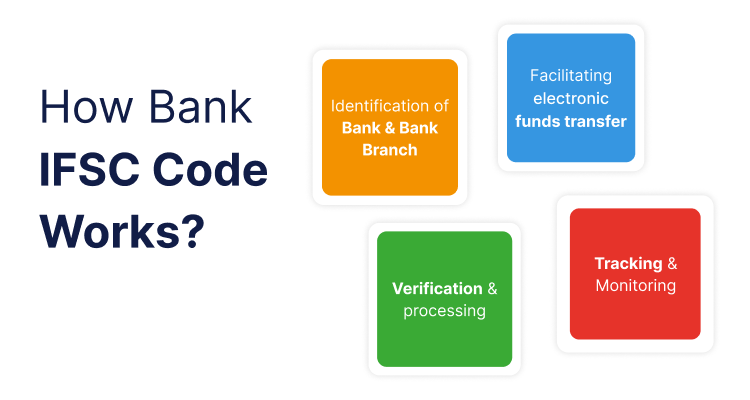How Bank IFSC Code Works?

Last Updated : July 30, 2024, 3:21 p.m.
The Indian Financial System Code, or IFSC, is more than just a random string of letters and numbers. It's a crucial part of banking infrastructure that enables the accurate processing of electronic payments across India.
Each IFSC code uniquely identifies a bank branch, making sure that every electronic transfer finds its way to the right destination. Understanding how IFSC codes work can help you navigate the world of online banking with more confidence and ease.
Understanding IFSC codes
IFSC is an 11-character alphanumeric code used to identify specific bank branches in India. It plays a crucial role in the online banking system, especially for Real Time Gross Settlement (RTGS), National Electronic Funds Transfer (NEFT), and Immediate Payment Service (IMPS).
Breaking down the components of an IFSC code
Here’s the structure of an IFSC code:
- The first four characters represent the bank code (e.g., HDFC for HDFC Bank).
- The fifth character is always '0' (reserved for future use).
- The last six characters identify the specific branch (e.g., 000123).
How does IFSC code work?
Now that we understand what an IFSC code is and its structure, let's look at how it works:
- Identification of bank and bank branch: The IFSC code plays a crucial role in identifying the bank and specific bank branch where the beneficiary account is held. This ensures the funds are transferred to the correct bank and branch, minimizing errors and delays.
- Facilitating electronic funds transfer: The IFSC code is used to facilitate various electronic payments like NEFT, RTGS, or IMPS. When a sender initiates a fund transfer, the IFSC code of the recipient’s bank branch is required to route the funds correctly.
- Verification and processing: During an electronic fund transfer, the sender's bank uses the IFSC code to pinpoint the recipient's bank and branch. The transaction request is forwarded to the recipient’s bank, which checks the IFSC code and deposits the money into the right account. This method confirms that the transaction details are correct and the funds are sent to the intended recipient.
- Tracking and monitoring: The Reserve Bank of India (RBI) uses IFSC codes to oversee and control electronic transactions in the banking system. This helps keep transactions clear and transparent, lowers the risk of fraud, and ensures that financial transactions run smoothly.
The importance of IFSC code
The IFSC code plays a crucial role in the smooth functioning of India's electronic payment system. It ensures that each transaction is directed to the correct bank branch, enhancing both accuracy and security. Here’s a deeper look into why IFSC codes are so important:

- Unique identification: Each IFSC code is specific to one bank branch, ensuring accurate identification and minimizing mistakes in fund transfers.
- Efficiency: IFSC codes help make electronic fund transfers quick and efficient, speeding up banking transactions and making them more convenient.
- Security: Using IFSC codes in transactions adds an extra layer of security, helping to protect against fraud and unauthorized access
- Convenience: IFSC codes make it possible to perform various online banking activities like paying bills, shopping online, and making investments, offering a smooth banking experience.
Summing Up!
In summary, IFSC codes streamline and secure the process of electronic money transfers. They play a pivotal role in ensuring that your funds are accurately and promptly transferred to the intended recipient’s bank account. By familiarizing yourself with how IFSC codes work, you can enhance your banking experience, making it safer and more efficient.
Frequently Asked Questions (FAQs)